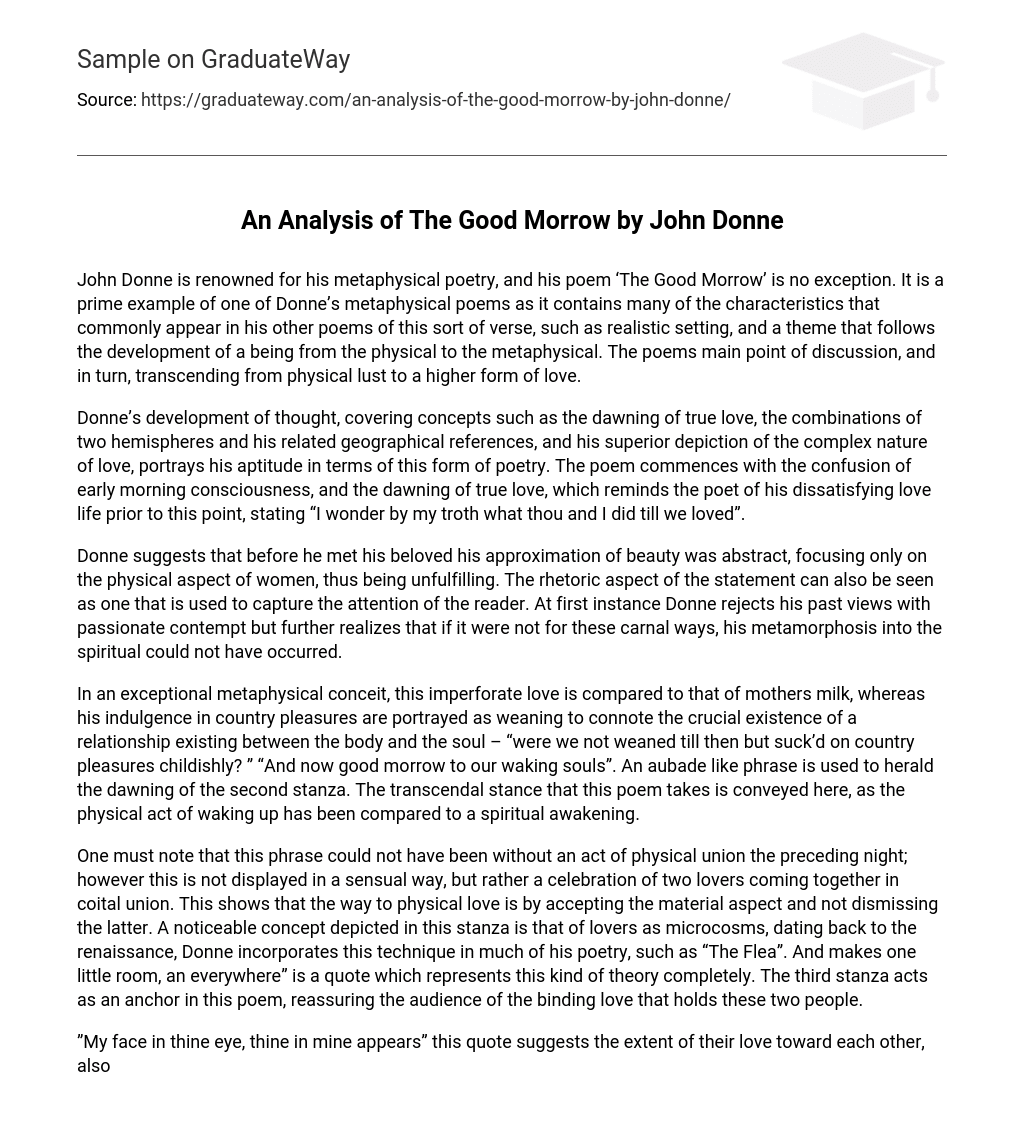John Donne is renowned for his metaphysical poetry, and his poem ‘The Good Morrow’ is no exception. It is a prime example of one of Donne’s metaphysical poems as it contains many of the characteristics that commonly appear in his other poems of this sort of verse, such as realistic setting, and a theme that follows the development of a being from the physical to the metaphysical. The poems main point of discussion, and in turn, transcending from physical lust to a higher form of love.
Donne’s development of thought, covering concepts such as the dawning of true love, the combinations of two hemispheres and his related geographical references, and his superior depiction of the complex nature of love, portrays his aptitude in terms of this form of poetry. The poem commences with the confusion of early morning consciousness, and the dawning of true love, which reminds the poet of his dissatisfying love life prior to this point, stating “I wonder by my troth what thou and I did till we loved”.
Donne suggests that before he met his beloved his approximation of beauty was abstract, focusing only on the physical aspect of women, thus being unfulfilling. The rhetoric aspect of the statement can also be seen as one that is used to capture the attention of the reader. At first instance Donne rejects his past views with passionate contempt but further realizes that if it were not for these carnal ways, his metamorphosis into the spiritual could not have occurred.
In an exceptional metaphysical conceit, this imperforate love is compared to that of mothers milk, whereas his indulgence in country pleasures are portrayed as weaning to connote the crucial existence of a relationship existing between the body and the soul – “were we not weaned till then but suck’d on country pleasures childishly? ” “And now good morrow to our waking souls”. An aubade like phrase is used to herald the dawning of the second stanza. The transcendal stance that this poem takes is conveyed here, as the physical act of waking up has been compared to a spiritual awakening.
One must note that this phrase could not have been without an act of physical union the preceding night; however this is not displayed in a sensual way, but rather a celebration of two lovers coming together in coital union. This shows that the way to physical love is by accepting the material aspect and not dismissing the latter. A noticeable concept depicted in this stanza is that of lovers as microcosms, dating back to the renaissance, Donne incorporates this technique in much of his poetry, such as “The Flea”. And makes one little room, an everywhere” is a quote which represents this kind of theory completely. The third stanza acts as an anchor in this poem, reassuring the audience of the binding love that holds these two people.
”My face in thine eye, thine in mine appears” this quote suggests the extent of their love toward each other, also connoting that time is of no worry, which one can relate back to the idea of these lovers being as microcosms. Donne’s conception of the compass is one other notion that is prevalent in this stanza. Without sharp north, without declining west? ” the metaphor of the compass is perhaps the most famous conceit in all of metaphysical poetry, it symbolizes the relationship between two lovers; two separate but joined bodies. In fact this geographical theme is one that appears recurrently in this poem. Apart from the themes already analyzed there are plenty of underlying notions not frequently discussed. The poet compares the first stage of love – sex and enjoyment – with the mature type of love, the harmonious relationship of two souls.
Donne’s wit can also be viewed in contrast between his two developed world – those of the lovers, and the remainder of the geographical world, there is no ‘sharp North’ or ‘declining west’ in the world of the lovers, it is a mutual relationship equal in quality and spirit, balanced and harmonized in such a manner that is not subject to time or decay. Donne proceeds from the night scene and the experience of lust, to the morning of pure love which gives him a new life and enables him to discover a new world in his confined room.
Evidence of platonic influence is also able to be found in his verses, the reference to the “seven sleepers cave” could possibly be a reference in this area, this sort of theory would be plausible as it has strong relation to the religious aspect, of which was a large influence to Donne. Donne’s manner is that of ‘concentration”; advancing his argument in stages, reasoning till he is able to prove his point and drive it home to the reader.
Moreover he marshals images from different sources in such a way that the cumulative effect is irresistible, the imagery has been drawn from various aspects of life, such as myths of everyday life, the geographical world, and scholastic philosophy. However the relation between one object and another is made intellectually not verbally. Donnes method, in spite of his scholarly references in spite of his references is not egotistical and appeals to the everyday reader through its material and sharp reasoning.





